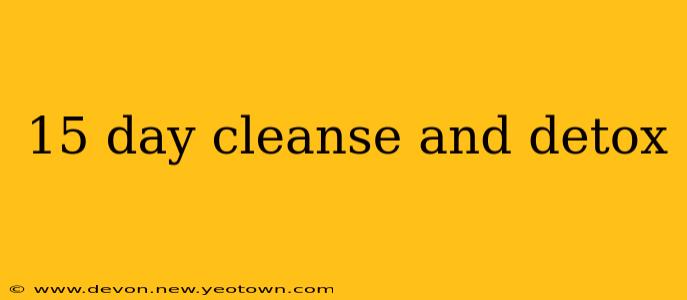The human body is a remarkable machine, constantly working to filter out toxins. But sometimes, we need a little extra help. That's where a cleanse and detox comes in. A 15-day cleanse isn't about quick fixes or drastic measures; it's about a gentle reset, a chance to nourish your body and support its natural detoxification processes. This isn't a magic bullet, but a supportive step towards a healthier lifestyle. Think of it as a spring cleaning for your insides – refreshing and revitalizing. This journey will focus on sustainable changes, not temporary deprivation. Let's begin!
What is a 15-Day Cleanse and Detox?
A 15-day cleanse and detox focuses on removing toxins from your body, boosting your energy levels, and improving overall well-being. This isn't about starvation diets or extreme measures; instead, it involves a thoughtful approach to nutrition and lifestyle choices. We'll focus on increasing nutrient-rich foods while minimizing processed foods, sugar, and harmful substances. The goal isn't rapid weight loss, but rather a sustained improvement in how you feel.
What Foods to Eat During a 15-Day Cleanse?
Focus on whole, unprocessed foods that support your body's natural detoxification processes. Think vibrant colors and nutrient density!
- Fruits and Vegetables: Load up on leafy greens, berries, cruciferous vegetables (broccoli, kale, cauliflower), and colorful fruits. These are packed with antioxidants and fiber, essential for cleansing.
- Lean Protein: Opt for sources like chicken breast, fish, beans, lentils, and tofu. Protein is crucial for maintaining muscle mass and energy levels.
- Whole Grains: Choose whole grains like quinoa, brown rice, and oats over refined grains. They offer sustained energy and fiber.
- Healthy Fats: Include avocados, nuts, seeds, and olive oil. Healthy fats are essential for hormone production and overall health.
- Hydration: Water is your best friend! Aim for at least 8 glasses a day to flush out toxins.
What Foods to Avoid During a 15-Day Cleanse?
This is where you'll make the biggest difference. Minimize or eliminate these culprits:
- Processed Foods: Say goodbye to packaged snacks, fast food, and processed meats.
- Sugar: Limit added sugar from all sources, including sugary drinks and desserts.
- Alcohol: Alcohol puts extra stress on your liver, which plays a vital role in detoxification.
- Caffeine: Reduce your caffeine intake as it can be dehydrating.
- Artificial Sweeteners: These can disrupt your gut microbiome.
What are the Benefits of a 15-Day Cleanse?
A well-planned cleanse can offer several benefits:
- Increased Energy: By reducing toxins and improving nutrient intake, you’ll often experience increased energy levels.
- Improved Digestion: A cleanse can help regulate your digestive system and reduce bloating.
- Clearer Skin: Many people report clearer skin after a cleanse, as toxins are often linked to skin problems.
- Weight Management: While not a guaranteed weight loss method, a cleanse can help you adopt healthier eating habits that support weight management.
- Improved Mental Clarity: Reduced inflammation and improved nutrient intake can contribute to improved cognitive function.
Is a 15-Day Cleanse Right for Me?
Before starting any cleanse, it’s crucial to consult your doctor, especially if you have pre-existing health conditions. This is particularly important if you are pregnant, breastfeeding, or taking medication. A personalized approach is always best.
What are Some Common Misconceptions About Cleanses?
Misconception: Cleanses magically remove all toxins. Reality: Your body already has natural detoxification systems. A cleanse supports these systems, not replaces them.
Misconception: Cleanses guarantee significant weight loss. Reality: While you might see some weight loss due to water retention, a cleanse’s primary goal is improved health, not dramatic weight change.
Misconception: Cleanses are a one-time fix. Reality: A cleanse should be seen as a stepping stone towards a healthier lifestyle. Sustained healthy habits are key.
How Can I Make a 15-Day Cleanse Sustainable?
The key to a successful cleanse isn't about restriction but about integration. Aim for gradual changes you can maintain long-term. Think of this as a reset, not a crash diet. Once the 15 days are over, continue incorporating the healthy habits you've established. Focus on long-term, sustainable changes, not quick fixes.
What Happens After a 15-Day Cleanse?
After your cleanse, continue to prioritize whole, unprocessed foods, hydration, and regular exercise. Listen to your body, and adjust your diet and lifestyle as needed. The goal is to maintain the positive changes you’ve experienced.
This 15-day cleanse journey is about self-care and nurturing your body's natural ability to thrive. Remember, consistency and sustainable changes are key to long-term health and well-being. Consult your doctor before starting any new diet or health program.

